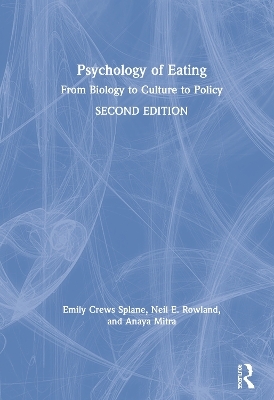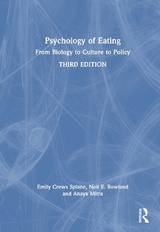
Psychology of Eating
Routledge (Verlag)
978-0-367-26324-9 (ISBN)
- Titel erscheint in neuer Auflage
- Artikel merken
The Psychology of Eating is the essential multi-disciplinary introduction to the psychology of eating, looking at the biological, genetic, developmental, and social determinants of how humans find and assimilate food.
Thoroughly revised and updated, the new edition brings multi-faceted expertise to the topic of normal and dysfunctional food intake, juxtaposing "normal" eating, eating in environments of food scarcity, and the phenomenon of "abnormal" eating prevalent in many modern-day developed societies. Eating disorders are not a focus, but also emerge from, this approach. Key features include:
A new expanded section considering the roles of business and government in creating and potentially solving the issue of "abnormal" eating
Learning objectives, talking points, and end-of-chapter glossaries
Chapter-by-chapter self-assessment questions.
With questions of food production, food choice, and environmental sustainability becoming more critical in an increasingly populated world, this is crucial reading for undergraduate courses in Psychology and other disciplines with a holistic and critical thinking approach to the psychology of food intake.
Emily Crews Splane, Ph.D., works in the Department of Behavioral Sciences at Flagler College, Florida. She received her Ph.D. in Behavioral Neuroscience from the University of Florida, where she also earned an M.S. in Behavioral Neuroscience. She earned a B.S. in Biology from Stetson University. She has conducted extensive research in behavioral neuroscience using techniques including autoradiography, immunohistochemistry, and operant conditioning. Neil E. Rowland, Ph.D., is Professor in the Department of Psychology at the University of Florida. He received an M.Sc. Experimental Psychology from the Sussex University in 1971 and a Ph.D. in Physiological Psychology from the University of London in 1971. His research interests center on the neurobiology of ingestive and addictive behaviors. Anaya Mitra, Ph.D., MPH, is an Associate Professor in the Psychology Department at St. Catherine University, Minnesota. She earned both her Ph.D. in Behavioral Neuroscience and her MPH from the University of Florida. She earned her B.A. in Psychology and Biology from Gustavus Adolphus College, Minnesota. Her research interests revolve around the biological, psychological and sociocultural factors which impact ingestive behaviors and the development of obesity.
1: Eating – you, the world, and food
2: Macronutrients, micro-nutrients, and metabolism
3: You are what you eat – economics & opportunism
4: Genetics, epigenetics, and microbiome
5: Chemosensation – nose, tongue, and gut
6: The hungry brain
7: Basic learning processes and eating behavior
8: The development of eating behaviors
9: Social influences on eating
10: Mood and food, cravings and addiction
11: Eating disorders and treatment
12: Personal weight loss strategies in obesity
13: Institutional approaches to healthful eating
| Erscheinungsdatum | 03.12.2019 |
|---|---|
| Zusatzinfo | 16 Tables, black and white; 17 Line drawings, black and white; 52 Halftones, black and white; 69 Illustrations, black and white |
| Verlagsort | London |
| Sprache | englisch |
| Maße | 178 x 254 mm |
| Gewicht | 625 g |
| Themenwelt | Geisteswissenschaften ► Psychologie ► Allgemeine Psychologie |
| Geisteswissenschaften ► Psychologie ► Sozialpsychologie | |
| Medizin / Pharmazie ► Gesundheitsfachberufe ► Diätassistenz / Ernährungsberatung | |
| Naturwissenschaften ► Biologie ► Humanbiologie | |
| Naturwissenschaften ► Biologie ► Zoologie | |
| ISBN-10 | 0-367-26324-6 / 0367263246 |
| ISBN-13 | 978-0-367-26324-9 / 9780367263249 |
| Zustand | Neuware |
| Informationen gemäß Produktsicherheitsverordnung (GPSR) | |
| Haben Sie eine Frage zum Produkt? |
aus dem Bereich



